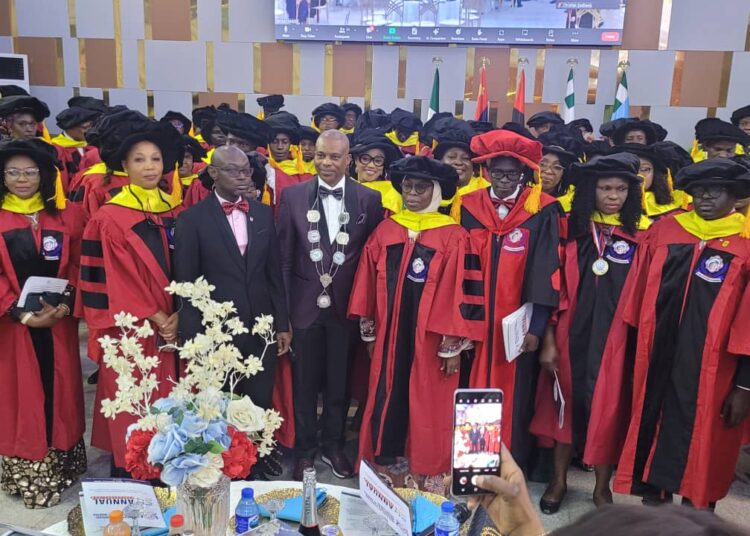The Director-General, National Institute for Policy and Strategic Studies (NIPSS), Prof. Ayo Omotayo, has called on the Federal Government to give legal backing to its national development plan to ensure implementation.
Omotayo made the call at the Annual Conference of the Institute of Strategic Management of Nigeria (ISMN) with the theme, ‘’Resetting National Priorities: The Role of Strategic Management’’ on Thursday in Abuja.
In a his keynote address, Omotayo stated that development policies fail due to lack of legal backing,adding that
the developmental challenges being faced by Nigeria stemmed from lack of national priorities on the part of the political and strategic leaders.
He said that everyone thinking privately and individually would not by themselves, define national priorities because they will define their own personal problems as national priorities.
According to him, there is no guideline for defining what national priorities are in various jobs and positions vis-à-vis the overarching national objective.
“Whenever you have a national development plan, it should be a law.
“When we sit down and we define these things as our national development plan, it should be a lot unchangeable for the period that you expect the development plan to last.
“But do we have that as a priority to stay on course and say this is what we are going to do until the change comes?
“Everybody comes into office and they personalised national agenda because most of the times when there is no guiding framework, personal objectives become national priorities,’’ he said.
Omotayo said the current challenges facing Nigeria were leadership, economic inequality, infrastructural deficit, corruption and governance issue as well as security concerns due to unemployment.
He said that resetting national priorities suggests a profound foray into the recalibration of Nigeria’s national building process.
He added that there was urgent need for a strategic realignment of the country’s priorities, with particular emphasis on the pivotal role that strategic management can play in the transformation process.
“ We face a myriad of challenges ranging from economic disparities, social unions, political complaint, all of which are called nation building process.
The President of ISMN, Mr Alex Enebeli, said there was need to review the progress of Nigeria to identify where it had failed especially in its agenda and development plans with a view to putting its priorities right.
Enebeli said the conference was intended to proffer solution and come up with recommendations that would help the nation go through all that it had planned.
He said there was need to know the priorities as a nation, work the priorities to their end, and set development plan for five or 10 or 50 years.
The Chairman/CEO Nigeria Economic Summit Group (NESG) Dr. Tayo Aduloju called on the government at all levels to establish strategic offices and appoint officers to execute strategies.
Speaking during the induction of 122 new fellows of the institute in Abuja, he said a recent survey showed that 9 out of 10 businesses on the continent are “failing to execute their strategy in 75% of the cases of strategic failure”.
“The problem is not good strategy, the problem is execution. It seems therefore that a body of strategies now transcend our capacity to build ground strategies at the continental, regional, national, corporates or even team level.
He recommended that key government institutions and programmes go beyond project management office (PMO) offices to having offices of strategic management.
“I think it’s crucial that executive officers as we have seen governorship, governors, senators, key strategic officers appoint everybody else such as technical special adviser, everything but very scarce in a few places one would see a proper strategists who’s in charge of managing not just strategy formulation or strategy execution and measuring strategic success”.
He said the imperatives of an office of strategic management is the challenge of the day, ” that strategic managers must transcend not just in the institutions but in their minds that we will not fail, because if this generation calls for solutions that count, ideas that become impact and outcomes, then few professions are better prepared, few practices are better equipped and few communities of professionals are better empowered.
He said Geopolitical or hidden economic uncertainties and old traditional problems are emerging in more polarized world.
He said the world is now closer to the possibly growing regional conflict in the Middle East that is fused with the Russia and Ukraine crisis.
“In Africa we are dealing with the triple crisis of finance, wealth and food that threaten the very fabric of the African experience and again, even though Africa had set a goal that by 20-30 we will feed ourselves and be free from the binding constraints of neuro communalism and other forms of global traps, we are now waiting.
“And then you go back home, here we thought those of us that were part of the strategies of either you were part of Vision 2010 or you were part of NEEDS in 1999 or you were part of Vision 2020. All forms of strategic planning and programming and foresight and attempts to get us to the country of our dreams have failed.
“We are here now in 2024 and I was saying to my founding fathers of the NESG that the characteristics of the macroeconomic situation today you play back 10 years when NESG was founded. They are the same or the difference is that they are of a different order and scale of magnitude.
“Therefore, distinguished strategists and fellows strategic thoughts is not translated into strategic success and it’s not in Nigerian problem, it’s happening at scale.
“It seems as the challenge of our time is strategic execution. Back on here, the answers to difficult questions like what are the plans? Everybody has an idea, what are the ideas? Everybody has greater ideas until you try to execute it. Therefore, my challenge to our generation of strategies is maybe we must now deepen the second leg. You know, you could have strategy development. Then you have the leg of translating strategy into tangible outcomes that that becomes not only the focus of the practice, but maybe even this, the deliberate intent to show that our profession and our practice matters.
The Chief of communications and Information Nigerian Air Force AVM Ibikunle Daramola on behalf of the inductees pledged to be good ambassadors of the institute.
We’ve got the edge. Get real-time reports, breaking scoops, and exclusive angles delivered straight to your phone. Don’t settle for stale news. Join LEADERSHIP NEWS on WhatsApp for 24/7 updates →
Join Our WhatsApp Channel










